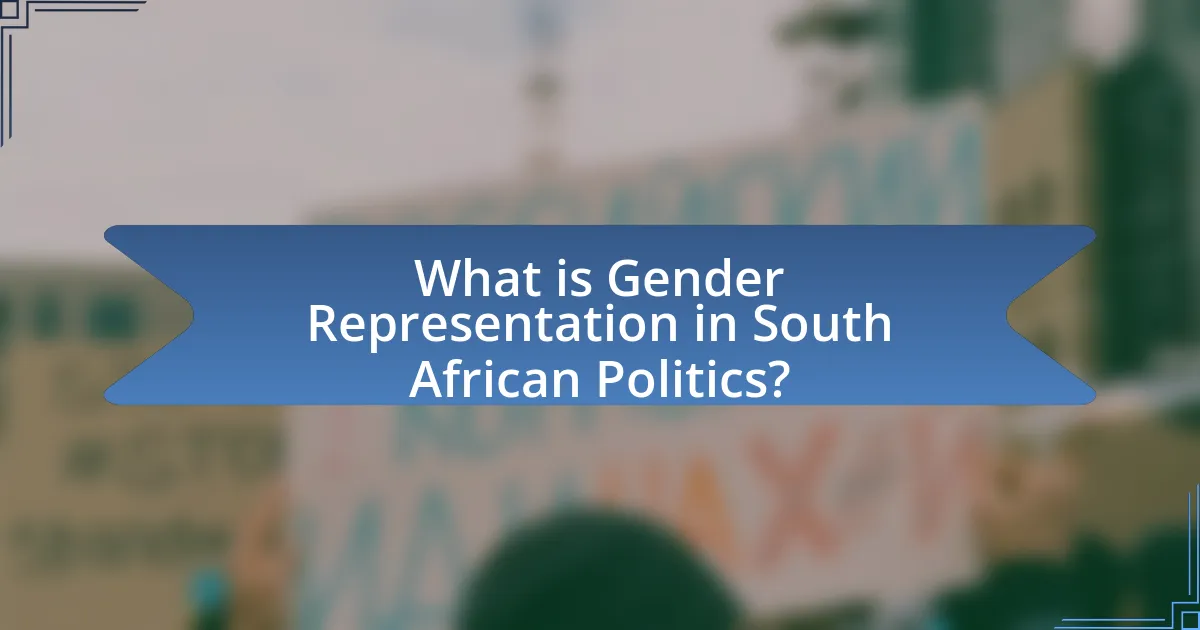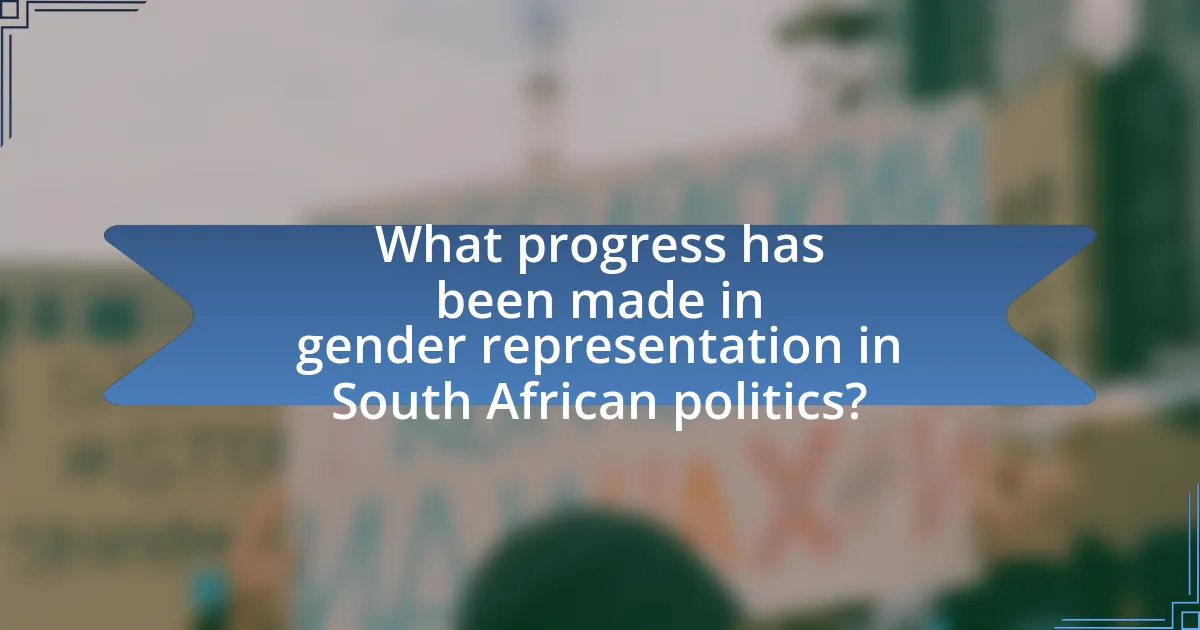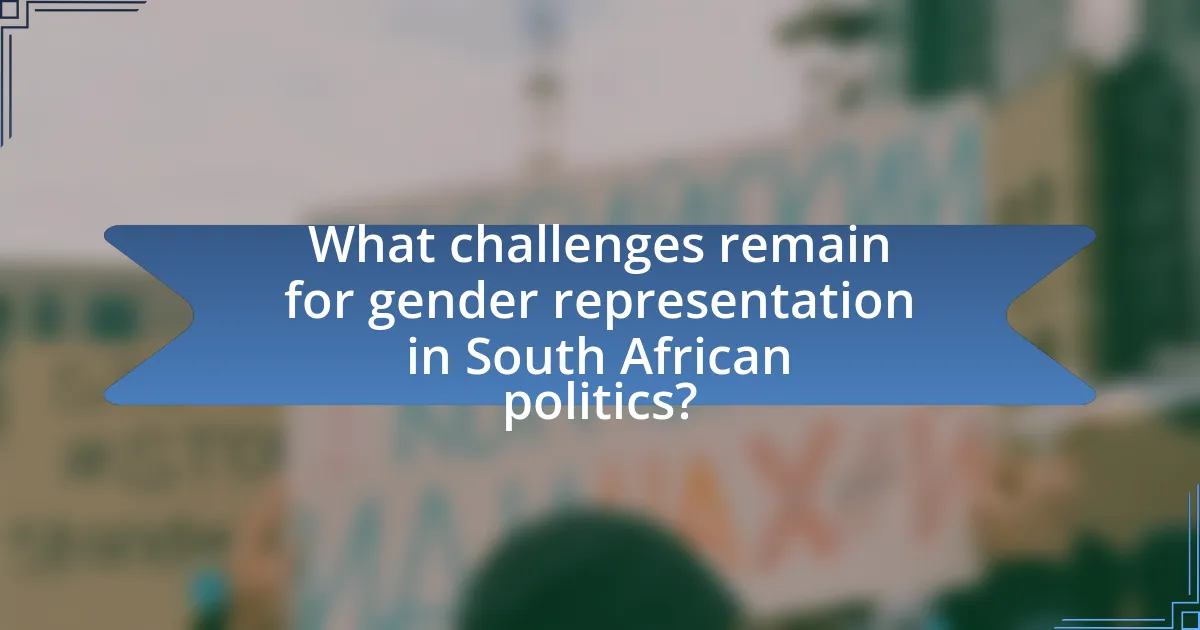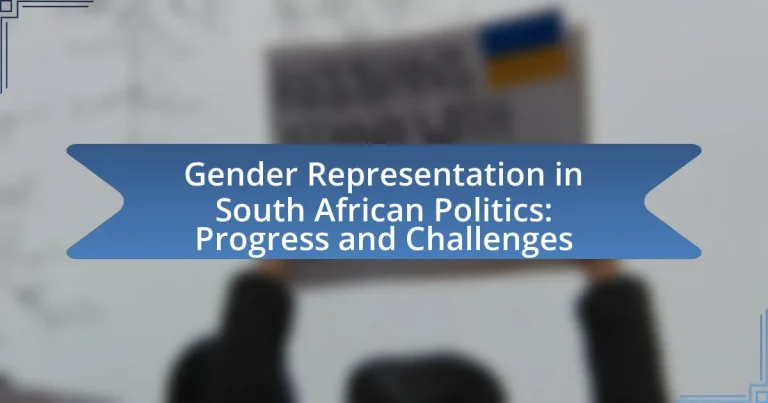Gender representation in South African politics refers to the inclusion of individuals of various genders, particularly women, in political decision-making and leadership roles. As of 2023, women occupy approximately 46% of seats in the National Assembly, positioning South Africa as a leader in gender representation in Africa. The article explores the importance of gender representation in ensuring diverse perspectives in policy-making, the historical context shaped by apartheid, and the legislative measures that have facilitated progress. It also addresses the ongoing challenges women face, including societal attitudes and structural barriers, while highlighting successful initiatives and the implications of underrepresentation in governance.

What is Gender Representation in South African Politics?
Gender representation in South African politics refers to the inclusion and participation of individuals of different genders, particularly women, in political decision-making processes and leadership roles. As of 2023, women hold approximately 46% of seats in the National Assembly, making South Africa one of the leading countries in gender representation in Africa. This progress is supported by legislative frameworks such as the Gender Equality Bill and the Constitution, which promote equal rights and opportunities. Despite these advancements, challenges remain, including societal attitudes and structural barriers that hinder full gender parity in political representation.
Why is gender representation important in politics?
Gender representation is important in politics because it ensures that diverse perspectives and experiences are included in decision-making processes. When women and marginalized genders participate in political leadership, policies are more likely to address the needs and rights of the entire population. Research indicates that countries with higher levels of gender representation in parliament, such as Rwanda, which has the highest percentage of women in government globally at over 60%, tend to have better outcomes in areas like health, education, and social welfare. This correlation highlights the significance of inclusive governance in promoting equitable development and social justice.
What historical context influences gender representation in South Africa?
The historical context influencing gender representation in South Africa is rooted in the legacy of apartheid, which enforced systemic racial and gender inequalities. Under apartheid, women, particularly black women, faced significant socio-economic disadvantages and were largely excluded from political participation. The 1994 democratic transition marked a pivotal shift, as the new Constitution enshrined gender equality and aimed to rectify past injustices. This legal framework facilitated increased representation of women in politics, with women holding 46% of parliamentary seats by 2021, reflecting a commitment to gender parity. However, challenges remain, including cultural norms and socio-economic barriers that continue to affect women’s political engagement and representation.
How does gender representation impact policy-making?
Gender representation significantly impacts policy-making by ensuring diverse perspectives are included in the decision-making process. When women are represented in political positions, policies tend to address issues such as healthcare, education, and gender equality more effectively. For instance, research from the Inter-Parliamentary Union indicates that countries with higher female representation in parliament are more likely to pass legislation promoting women’s rights and social welfare. This correlation highlights that gender-diverse leadership can lead to more comprehensive and equitable policies, ultimately benefiting society as a whole.
What are the current statistics on gender representation in South African politics?
As of 2023, women hold 46% of the seats in the National Assembly of South Africa, reflecting significant progress in gender representation. This statistic indicates that South Africa ranks among the top countries globally for female parliamentary representation. Additionally, women occupy 50% of the cabinet positions, showcasing a commitment to gender parity in leadership roles. These figures are supported by data from the Inter-Parliamentary Union, which highlights South Africa’s ongoing efforts to enhance women’s participation in politics.
How do these statistics compare to global standards?
South Africa’s gender representation statistics in politics show a significant advancement compared to global standards, with women holding approximately 46% of parliamentary seats as of 2023. This figure exceeds the global average of around 26% for women in national parliaments, as reported by the Inter-Parliamentary Union. Furthermore, South Africa ranks among the top countries in Africa for female political representation, indicating a progressive stance on gender equality in governance.
What trends have emerged in recent elections regarding gender representation?
Recent elections in South Africa have shown a significant increase in gender representation, particularly with more women being elected to political positions. In the 2019 national elections, women constituted 46% of the African National Congress (ANC) candidates, reflecting a commitment to gender parity. Additionally, the overall representation of women in the National Assembly rose to 50%, marking a historic high. This trend is supported by the implementation of gender quotas and advocacy from organizations promoting women’s rights, which have influenced political parties to prioritize female candidates.

What progress has been made in gender representation in South African politics?
Significant progress has been made in gender representation in South African politics, particularly since the end of apartheid in 1994. The South African government has implemented policies aimed at increasing women’s participation, resulting in women holding 46% of seats in the National Assembly as of 2021, which is among the highest in the world. The Constitution mandates equality, and the African National Congress has adopted a 50% gender quota for its candidates. Additionally, the establishment of the Commission for Gender Equality has further promoted women’s rights and representation. These measures demonstrate a commitment to enhancing gender equity in political spaces.
What legislative measures have been implemented to promote gender equality?
Legislative measures implemented to promote gender equality in South Africa include the Promotion of Equality and Prevention of Unfair Discrimination Act of 2000, which aims to eliminate discrimination and promote equality. Additionally, the Employment Equity Act of 1998 mandates equal opportunity and fair treatment in the workplace, specifically addressing gender disparities. The South African Constitution, adopted in 1996, enshrines the right to equality and prohibits discrimination based on gender. These measures collectively support gender equality by establishing legal frameworks that protect women’s rights and promote their representation in various sectors.
How effective have these measures been in increasing female political participation?
The measures implemented to increase female political participation in South Africa have been effective, resulting in a significant rise in women’s representation in government. For instance, the introduction of gender quotas has led to women holding 46% of seats in the National Assembly as of 2021, compared to just 27% in 1994. Additionally, the African National Congress (ANC) has adopted a policy of 50% female representation on its candidate lists, which has further contributed to this increase. These statistics demonstrate that targeted measures have successfully enhanced female political participation in South Africa.
What role do political parties play in promoting gender representation?
Political parties play a crucial role in promoting gender representation by establishing policies and frameworks that encourage the inclusion of women in political positions. In South Africa, political parties have implemented gender quotas, which mandate a certain percentage of women candidates on electoral lists, significantly increasing female representation in legislative bodies. For instance, the African National Congress adopted a 50% gender quota for its candidates, resulting in women holding 46% of seats in the National Assembly as of 2021. This strategic approach not only enhances women’s visibility in politics but also influences legislative priorities to address gender-specific issues, thereby fostering a more equitable political landscape.
What successes can be highlighted in female political leadership?
Female political leadership in South Africa has achieved significant successes, notably in increasing representation and influencing policy. For instance, women hold 46% of seats in the National Assembly, surpassing the global average of 25%, which demonstrates a commitment to gender parity in governance. Additionally, female leaders have played crucial roles in advancing legislation on issues such as gender-based violence and reproductive rights, with the Gender-Based Violence Act of 2021 being a key example of policy influenced by female leadership. These achievements underscore the positive impact of women in political roles, contributing to more inclusive and equitable governance in South Africa.
Who are some prominent female leaders in South African politics?
Prominent female leaders in South African politics include Nkosazana Dlamini-Zuma, who served as the Minister of Health and later as the Minister of Home Affairs, and Phumzile Mlambo-Ngcuka, who was the Deputy President from 2005 to 2008. Additionally, Baleka Mbete has held significant positions, including Speaker of the National Assembly. These leaders have played crucial roles in shaping policies and advancing gender representation in the political landscape of South Africa.
What initiatives have been successful in empowering women in politics?
Successful initiatives in empowering women in politics include the implementation of gender quotas, which have significantly increased female representation in legislative bodies. For instance, South Africa’s 1996 Constitution mandates that at least 30% of candidates for public office must be women, leading to a rise in women’s participation from 27% in 1994 to over 46% in the National Assembly by 2021. Additionally, organizations like the African Women’s Development Fund provide financial support and training for women candidates, enhancing their political skills and visibility. These initiatives demonstrate a clear correlation between structured policies and increased female political empowerment.

What challenges remain for gender representation in South African politics?
Challenges for gender representation in South African politics include systemic barriers, cultural norms, and inadequate support structures. Despite the constitutional commitment to gender equality, women remain underrepresented in leadership roles, with only about 27% of parliamentary seats held by women as of 2023. Cultural attitudes often prioritize male leadership, hindering women’s political participation. Additionally, political parties frequently lack mechanisms to support female candidates, such as mentorship programs or funding, which further limits their ability to compete effectively. These factors collectively contribute to the ongoing challenges in achieving equitable gender representation in South African politics.
What barriers do women face in entering politics?
Women face several barriers in entering politics, including societal norms, lack of financial resources, and limited access to networks. Societal norms often dictate traditional gender roles, discouraging women from pursuing political careers. Financial constraints hinder women’s ability to campaign effectively, as political campaigns can be costly. Additionally, women frequently lack access to influential networks that are crucial for political advancement, which is supported by research indicating that only 27% of women in South Africa have access to political networks compared to their male counterparts. These barriers collectively contribute to the underrepresentation of women in South African politics.
How do societal attitudes affect women’s political participation?
Societal attitudes significantly influence women’s political participation by shaping perceptions of gender roles and the acceptability of female leadership. In South Africa, traditional views often prioritize male authority, which can discourage women from engaging in politics. Research indicates that when communities hold progressive attitudes towards gender equality, women’s political participation increases; for instance, a study by the African Gender Institute found that areas with higher gender equity awareness saw a 30% rise in women’s political candidacy. Thus, societal attitudes directly correlate with the level of women’s involvement in political processes.
What role does violence and intimidation play in hindering female politicians?
Violence and intimidation significantly hinder female politicians by creating an environment of fear that discourages their participation in politics. This intimidation manifests through threats, physical violence, and harassment, which can lead to psychological distress and a reluctance to engage in political activities. For instance, a study by the Electoral Institute for Sustainable Democracy in Africa (EISA) found that women in South Africa face higher levels of violence and intimidation compared to their male counterparts, which directly impacts their political ambitions and effectiveness. Such hostile conditions not only limit the number of women willing to run for office but also undermine their ability to advocate for policies that promote gender equality and social justice.
What are the implications of underrepresentation of women in political decision-making?
The underrepresentation of women in political decision-making leads to a lack of diverse perspectives and interests in governance. This absence can result in policies that do not adequately address the needs of half the population, perpetuating gender inequality. For instance, research by the Inter-Parliamentary Union indicates that countries with higher female representation in parliament tend to have more progressive legislation on issues such as health, education, and gender equality. Furthermore, the World Economic Forum’s Global Gender Gap Report highlights that nations with greater gender parity in political roles experience improved economic performance and social outcomes. Thus, the implications of women’s underrepresentation are significant, affecting both policy effectiveness and societal equity.
How does gender imbalance affect governance and policy outcomes?
Gender imbalance negatively affects governance and policy outcomes by limiting diverse perspectives in decision-making processes. When women are underrepresented in political leadership, policies often fail to address issues that disproportionately impact women, such as healthcare, education, and gender-based violence. Research by the Inter-Parliamentary Union indicates that countries with higher female representation in parliament tend to have more progressive policies on social issues. For instance, Rwanda, with over 60% female representation in its legislature, has implemented effective laws promoting gender equality and women’s rights. This evidence demonstrates that gender balance in governance leads to more comprehensive and equitable policy outcomes.
What strategies can be employed to overcome these challenges?
To overcome challenges in gender representation in South African politics, implementing targeted policies and initiatives is essential. These strategies include enforcing gender quotas to ensure a minimum representation of women in political positions, which has been shown to increase women’s participation in governance. For instance, countries like Rwanda have successfully utilized gender quotas, resulting in over 60% female representation in their parliament. Additionally, providing training and mentorship programs for women aspiring to enter politics can enhance their skills and confidence, leading to greater electoral success. Research indicates that such initiatives can significantly improve women’s political engagement and representation.
What practical steps can be taken to enhance gender representation in South African politics?
To enhance gender representation in South African politics, implementing gender quotas is essential. Gender quotas can ensure that a minimum percentage of candidates in political parties are women, thereby increasing their representation in legislative bodies. For instance, countries like Rwanda have successfully utilized quotas, resulting in women holding over 60% of parliamentary seats, demonstrating the effectiveness of this approach. Additionally, providing training and mentorship programs for women aspiring to enter politics can equip them with the necessary skills and confidence to compete effectively. Research by the African Gender Institute indicates that such initiatives significantly improve women’s political participation. Furthermore, promoting public awareness campaigns about the importance of gender diversity in leadership can shift societal attitudes and encourage support for female candidates.


